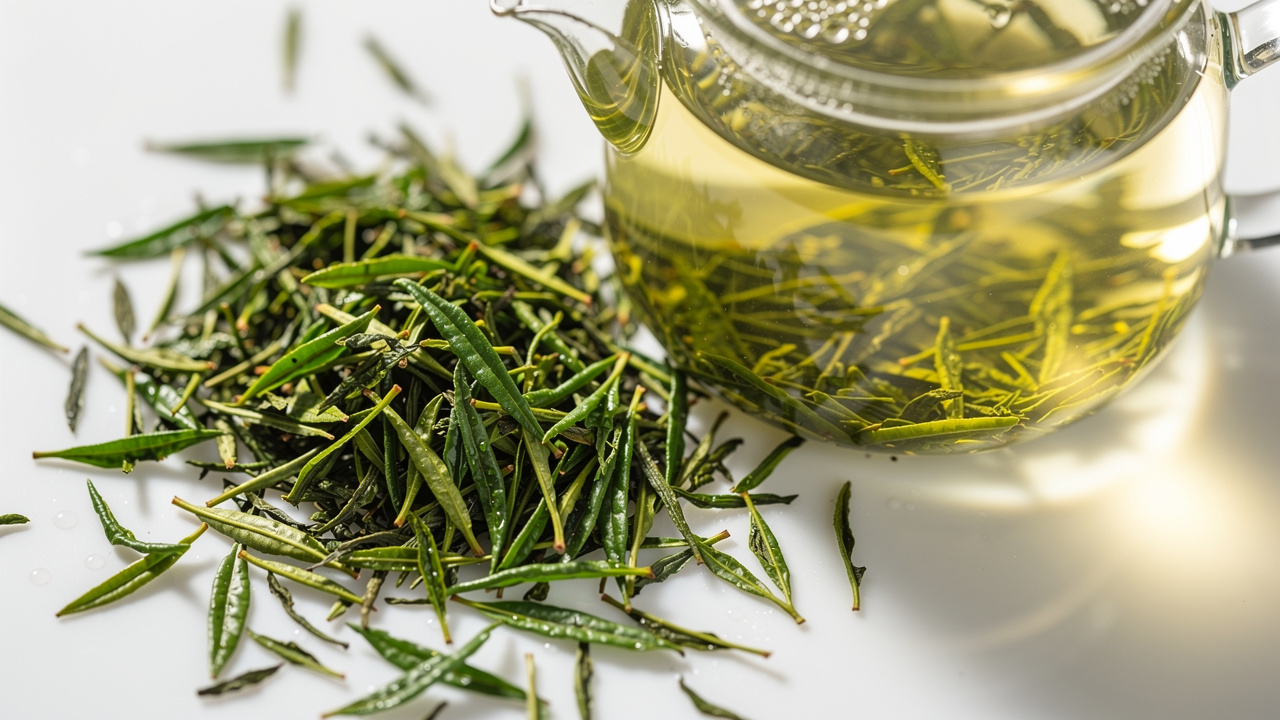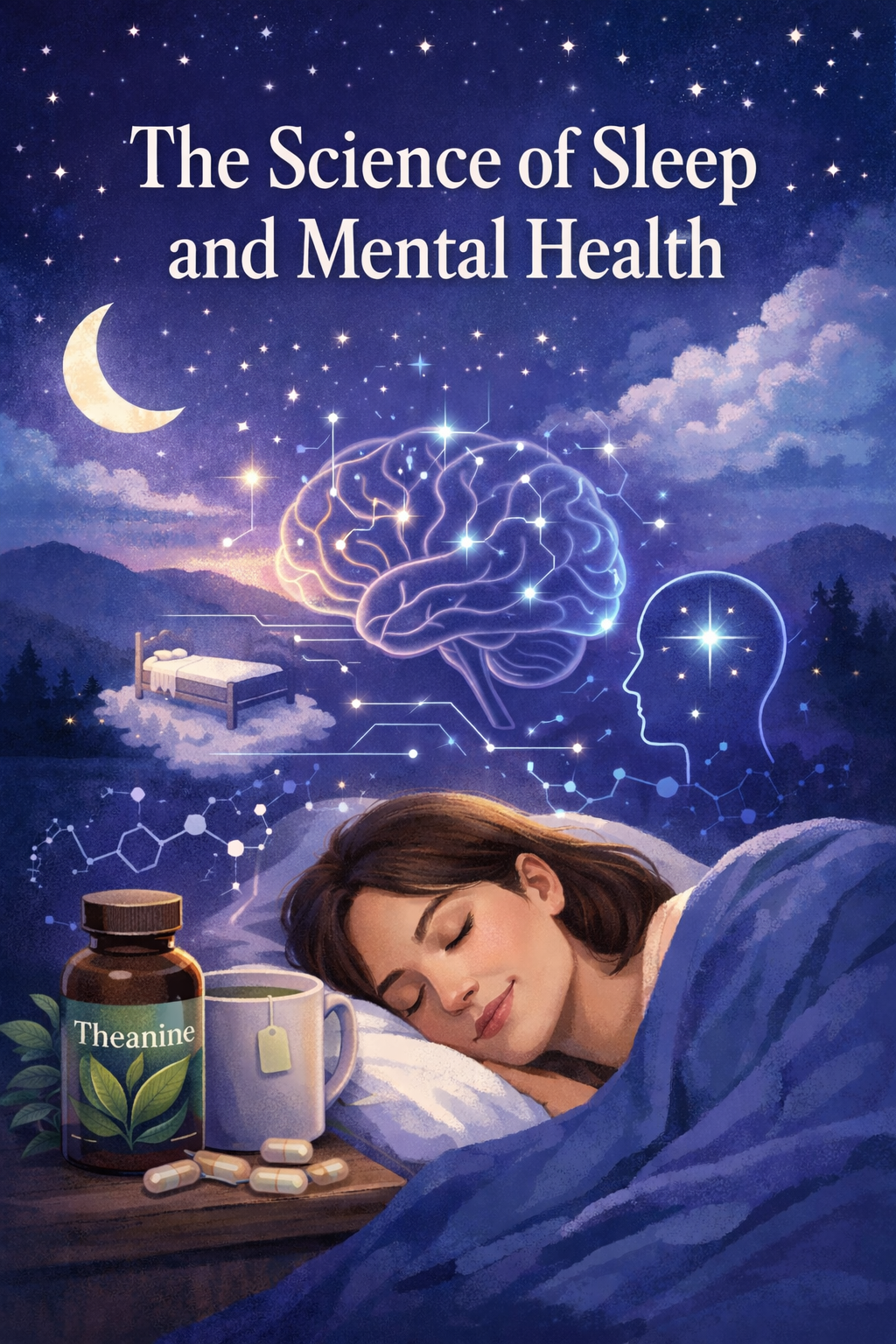Introduction: Theanine For Sleep And The Art Of Restful Calm
Theanine for sleep has become a favorite topic among people who want deeper rest without feeling knocked out or foggy the next day. This gentle amino acid, best known from green tea, is now a key ingredient in many sleep formulas, including products such as Deeper Sleep, and is widely studied for its calming effects on the nervous system.
Rather than forcing the body into sleep, L-theanine works more like a quiet conversation with the brain. It eases mental tension, softens the stress response, and supports the relaxed awareness that naturally comes before sleep. For health-conscious professionals, parents, and anyone who lies awake with a racing mind, theanine for sleep offers a way to wind down that still respects clarity and focus.
In this guide, we’ll walk through what theanine is, how it works in the brain, and five key benefits that matter if you live with stress-related sleep issues. We’ll also look at research findings, dosing, safety, and how theanine can fit alongside other natural tools in your nighttime routine.
“Sleep is not an optional lifestyle luxury; it is a non-negotiable biological necessity.”
— Matthew Walker, PhD, Why We Sleep
What Is L-Theanine?

L-theanine is a unique functional amino acid that is water‑soluble and non‑protein-forming, found almost exclusively in the leaves of the Camellia sinensis plant—the source of green, black, white, and oolong teas—and in a few types of mushrooms. Unlike most amino acids, it is not used to build proteins. Its main influence is on the brain.
After you ingest it, L-theanine is absorbed into the bloodstream and crosses the blood–brain barrier within about 30–40 minutes. Once there, it interacts with receptors and neurotransmitters that shape mood, stress response, and sleep. Tea drinkers experience it every day, often without realizing it, as the subtle calm that balances the stimulating effects of caffeine.
For a deeper dive into the studies behind this amino acid, you can explore the science that underpins its role in stress regulation and sleep.
L-theanine is available not only in tea but also in capsules, powders, and blends designed for relaxation, focus, and sleep support. At a glance, it is:
-
Found primarily in tea leaves and a few mushrooms
-
Fast-acting, reaching the brain in under an hour
-
Known for promoting calm alertness rather than heavy sedation
How Theanine For Sleep Works In The Brain

The calming effect of theanine for sleep is rooted in brain chemistry. Its structure resembles glutamate, the brain’s primary excitatory neurotransmitter. Because of this similarity, L-theanine can sit at some of the same receptor sites, gently dialing down overactivity rather than shutting the system off.
Several key actions are especially relevant for sleep:
-
Boosts GABA, serotonin, and dopamine
L-theanine increases levels of gamma‑aminobutyric acid (GABA), the main inhibitory neurotransmitter associated with calm and reduced neural “noise.” It also supports serotonin and dopamine, which influence mood, motivation, and the sleep–wake cycle. -
Reduces glutamate and norepinephrine signaling
By interfering with glutamate’s binding and lowering stress‑related norepinephrine, theanine helps quiet the “fight‑or‑flight” response that keeps many minds wired at night. -
Increases alpha brain waves
Research shows that high-dose L-theanine–caffeine combination improves alpha brain wave activity—the pattern seen in meditative, relaxed wakefulness—supporting both mental clarity and relaxation. This state feels mentally clear, yet at ease, creating a bridge between the intensity of the day and the surrender of sleep.
Taken together, these effects help explain why theanine for sleep can make you feel calmer, less reactive, and more ready to drift off, without the heavy sedation associated with many pharmaceutical sleep aids.
Five Key Benefits Of Theanine For Better Relaxation And Sleep
Based on current research and real-world use, several themes appear again and again when people add L-theanine to their sleep routine.
1. A Calmer, Less Anxious Mind At Night

For many people, the real barrier to rest is not the body but the mind—the endless loop of tasks, worries, and what‑ifs, which is why research on how L-theanine may relieve depression and anxiety has gained significant attention in sleep science. Theanine for sleep helps by shifting the neurochemical balance away from hyperarousal and toward ease.
By raising GABA and serotonin while lowering norepinephrine, L-theanine tends to:
-
Soften anxious thinking
-
Reduce physical tension (racing heart, tight chest, shallow breathing)
-
Support an emotionally steadier mood across the evening
These effects echo what many people seek through mindfulness or breathing practices. Combining theanine with a quiet, dimly lit pre‑bed routine—or with a structured approach such as Reclaim Your Sleep: The SLP1 Protocol for Moms to Win Their Sleep Back—can create a strong foundation for more peaceful nights. For some, adding a dedicated sleep formula like Deeper Sleep strengthens that calming base.
2. Easier Time Falling Asleep
One of the clearest benefits from clinical trials is a self‑reported improvement in how quickly people fall asleep. A large review of randomized, controlled studies found that participants taking L-theanine reported shorter sleep onset latency—the time from “lights out” to actually drifting off—compared with placebo.
This doesn’t mean every sleep lab measure changes dramatically. In some studies, devices do not always detect big shifts in exact minutes to sleep, yet people still feel they fall asleep more easily and struggle less with bedtime anxiety.
Theanine for sleep is especially helpful if your main complaint is:
-
Lying awake with a racing mind
-
Anticipatory anxiety about “another bad night”
-
Trouble “coming down” after late work, intense exercise, or screen time
If getting to sleep is your primary frustration, pairing theanine with a focused formula such as Get To Sleep may further support the transition from alertness to rest.
3. Better Perceived Sleep Quality And Next‑Day Functioning
Another consistent theme in the research is that people taking L-theanine report:
-
Better overall sleep quality scores
-
Less daytime fatigue and irritability
-
Improved sense of restoration on waking
Interestingly, this subjective improvement sometimes appears even when objective measures like total sleep time or sleep efficiency change only modestly. In other words, theanine for sleep may not always add hours to the clock, but it can make the hours you do get feel deeper and more satisfying.
For those dealing with stress‑related insomnia, this matters. When you wake feeling more rested and functional—even after a shorter night—the entire relationship with sleep begins to shift. Integrating a calming blend like Deeper Sleep into a consistent bedtime rhythm can strengthen this perception of depth and renewal.
4. Relaxation Without Daytime Sedation
Unlike many sleep medications that linger into the next morning, theanine offers calm without dulling. Because it promotes alpha brain waves rather than outright sedation, L-theanine can be used both at night and, in lower doses, during the day.
This is especially helpful if you:
-
Have a demanding job but live with chronic stress
-
Want relief from tension without losing mental sharpness
-
Rely on caffeine but dislike jitters or anxiety
Studies show that combining L-theanine with moderate caffeine can improve focus and attention while reducing the edgy side effects of caffeine alone. The same calming properties that support theanine for sleep at night can, in smaller doses, support smoother concentration during the day.
5. Gentle Support For Stress‑Related Health Concerns
Chronic stress does more than disturb sleep. It influences blood pressure, immune defenses, and overall resilience. Early research suggests that L-theanine may:
-
Reduce spikes in blood pressure during stressful mental tasks
-
Lower markers of physiological stress, such as heart rate and cortisol
-
Support immune function and reduce the incidence of some upper respiratory infections
There is also preliminary work exploring L-theanine’s role alongside certain chemotherapy drugs, though this remains an area where medical supervision is essential.
Because of these broader effects, theanine for sleep can be part of a wider strategy to address stress at its roots. The emerging data, along with resources like the the science page, point to its promise as a gentle ally for both mind and body.
How Effective Is Theanine For Sleep? What The Research Shows
Research on theanine for sleep spans small clinical trials, larger meta‑analyses, and studies in specific populations.
Subjective Improvements
Across multiple randomized, controlled trials, L-theanine supplementation has been associated with:
-
Shorter self‑reported time to fall asleep
-
Improved overall sleep quality scores
-
Reduced daytime dysfunction (less sleep‑related fatigue, irritability, and trouble concentrating)
These findings are strongest in people dealing with stress, generalized anxiety, or mild sleep disturbances, rather than in those with severe, chronic insomnia.
Objective Measures
When researchers looked at polysomnography (sleep lab testing) and actigraphy (wearable sleep tracking), the picture was more mixed. Many studies did not find large, consistent changes in:
-
Total sleep time
-
Sleep efficiency (percentage of time in bed spent truly asleep)
-
Number or length of nighttime awakenings
This suggests that theanine’s main contribution may be in how sleep feels—calmer, less pressured, and more refreshing—rather than in sharply reshaping every sleep stage. For many people living with high stress, that shift in felt experience is still very meaningful.
Special Populations
-
Children with ADHD:
One trial in boys with ADHD found that 400 mg of L-theanine per day improved objective sleep efficiency and reduced nighttime restlessness. Any use in children should be overseen by a pediatric clinician. -
People with mood or anxiety disorders:
Studies in individuals with generalized anxiety, major depressive disorder, and schizophrenia have reported better self‑rated sleep quality and reduced anxiety with daily theanine.
Taken together, the data describe theanine for sleep as a gentle, well‑tolerated aid that helps many people feel more at peace with bedtime, even when objective sleep metrics change only modestly. More work—much of it summarized on the science—continues to refine exactly who benefits most and at what doses.
Theanine For Sleep: Dosage, Timing, And Practical Use

There is no single, official “right” dose of theanine for sleep, but clinical research offers reasonable starting points.
Typical Adult Doses
-
Common studied range: 50–400 mg per day
-
Frequently used for sleep and relaxation: 200–400 mg, often taken in the evening
Many people start with 200 mg about 30–60 minutes before bed and adjust based on response. Some find that splitting the dose—one portion in the late afternoon and another close to bedtime—smooths the transition out of a stressful workday.
If you already use a formula such as Deeper Sleep, read the label carefully to see how much L-theanine it contains so you can avoid overshooting your total daily intake.
Timing Considerations
For sleep, evening dosing makes the most sense:
-
Take L-theanine when you start your wind‑down period (lights dim, devices off, quiet activities).
-
Allow at least 30 minutes for absorption and brain entry.
-
Consider pairing it with calming practices: breathwork, light stretching, or a warm shower.
Some people also take smaller doses (e.g., 50–100 mg) earlier in the day to take the edge off work stress without feeling sluggish.
Tea Versus Supplements
A typical cup of brewed tea contains about 25–60 mg of L-theanine, depending on:
-
Type of tea (shade‑grown green teas like matcha often contain more)
-
Amount of leaf used
-
Steeping time
Reaching the 200–400 mg range through tea alone would require several cups and a significant amount of caffeine—problematic for anyone with sleep issues. For this reason, many people interested in theanine for sleep choose:
-
Decaffeinated green or black tea in the evening, plus
-
A standardized L-theanine supplement or a comprehensive blend such as Deeper Sleep
Always discuss new supplements with a healthcare professional, especially if you take medications or have underlying medical conditions.
Combining Theanine For Sleep With Other Natural Aids
Many people do not rely on a single compound for better rest. Theanine for sleep often sits alongside other nutrients and botanicals that address different parts of the sleep picture.
Theanine And Glycine
Glycine is an amino acid that supports sleep by lowering core body temperature and calming the nervous system. Animal research suggests that combining L-theanine with GABA (and, by extension, other calming compounds) may reduce time to fall asleep and prolong sleep duration more than either alone.
If you’re interested in this pairing, Glycine for Sleep: A Comprehensive Guide is a thoughtful resource for understanding how glycine fits into a broader protocol. If you already take a sleep product such as Deeper Sleep, check whether glycine or other GABA‑supporting nutrients are included before adding stand‑alone supplements.
Theanine And Reishi Mushroom
Reishi mushroom is often described as a calming, stress‑modulating fungus that works over time to support resilience and deeper rest. The article Reishi Mushroom For Sleep: A Practical Guide explores how it may help regulate stress hormones and nervous system balance.
While theanine tends to act more quickly at the level of brainwaves and neurotransmitters, reishi seems to support long‑term adaptation to stress. Many wellness enthusiasts take theanine for sleep at night while using reishi teas or capsules earlier in the evening to build a more grounded baseline.
Theanine And Melatonin
Melatonin is the hormone that signals darkness to the body and helps regulate circadian rhythm. It doesn’t directly calm the mind; instead, it tells your internal clock that it’s time to sleep.
The guide Melatonin Nasal Spray: A Comprehensive Guide explains how fast‑acting melatonin delivery can be helpful for those with shifted schedules or jet lag.
Because L-theanine reduces pre‑sleep tension, combining it with melatonin can:
-
Prepare the mind and emotions for sleep
-
Support accurate timing of the sleep–wake cycle
-
Help align internal and external clocks, especially after travel or late‑night work
Theanine Within Structured Sleep Protocols
Some people need more than a supplement; they need a framework for rebuilding their relationship with sleep. That is where stepwise approaches such as Reclaim Your Sleep: The SLP1 Protocol for Moms to Win Their Sleep Back come in.
Within such frameworks, theanine for sleep can:
-
Soften anxiety around bedtime rituals
-
Support adherence to regular bed and wake times
-
Work alongside formulations like Deeper Sleep and Get To Sleep as part of a coherent, evidence‑informed plan
When combining multiple aids, it is wise to introduce them gradually, track responses, and consult a clinician about potential interactions.
Natural Sources Vs Supplements: Choosing Your Theanine
Both natural foods and supplements have a place in a sleep‑supportive routine.
Natural Sources
-
Tea (green, black, white, oolong):
The most common dietary source of L-theanine.-
Pros: Pleasant ritual, rich in antioxidants, widely available.
-
Cons: Contains caffeine unless decaffeinated, making evening use tricky for light sleepers.
-
-
Certain mushrooms:
Some mushrooms contain theanine‑like compounds, though research is far less extensive than for tea. These may be more relevant for general wellness than as a primary sleep source.
Supplements
L-theanine supplements come in capsules, powders, chewables, and blends:
-
Offer precise, consistent dosing
-
Can reach clinically studied levels (e.g., 200–400 mg) without excess caffeine
-
Often appear in multi‑ingredient formulas such as Deeper Sleep, which pair theanine with other sleep‑supportive nutrients
For a more technical look at these delivery forms and their evidence base, SLP1’s the science resource provides a research‑driven perspective.
Many people combine both approaches: daytime tea as a mindful ritual, and evening supplementation when the focus turns specifically to sleep quality.
A quick comparison:
|
Option |
Best For |
Watch Out For |
|---|---|---|
|
Tea |
Gentle daily intake and soothing ritual |
Caffeine content, especially at night |
|
Supplements |
Targeted doses and predictable intake |
Need for quality sourcing, interactions with medications |
Safety, Side Effects, And When To Be Careful
Theanine for sleep has an excellent safety record for most healthy adults, especially at doses commonly used in studies. Still, thoughtful use is important.
General Safety
-
L-theanine is classified by the FDA as “Generally Recognized As Safe” (GRAS) as a food ingredient up to 250 mg per serving.
-
Clinical trials report very few side effects, and most are mild:
-
Occasional headache or migraine
-
Nausea or mild digestive discomfort
-
Transient drowsiness at higher doses
-
These usually resolve quickly and often occur at similar rates in placebo groups.
Tea‑Related Concerns
Many potential issues stem not from theanine itself but from caffeine and other constituents in tea or green tea extracts:
-
High caffeine intake can cause anxiety, palpitations, insomnia, or stomach upset.
-
Concentrated green tea extracts have, in rare cases, been linked to liver problems at very high doses.
If you’re sensitive to caffeine or already struggle with insomnia, prioritize decaffeinated teas in the evening and use standardized theanine for sleep instead of heavily caffeinated beverages.
Special Populations
-
Pregnancy and breastfeeding:
Safety data for L-theanine supplements in these groups are limited. Because caffeine intake is also a concern in pregnancy, consult your obstetric provider before increasing tea or adding theanine supplements. -
Children:
One trial suggests benefit and good tolerance in boys with ADHD, but long‑term safety is not fully established. Any use in children should be supervised by a pediatrician.
Possible Medication Interactions
Always check with your prescribing clinician or pharmacist before adding theanine for sleep if you take medications, especially:
-
Stimulant drugs (for ADHD or narcolepsy)
-
Blood pressure medications (theanine may lower blood pressure modestly)
-
Antidepressants or anti‑anxiety medications
-
Anti‑seizure medications
-
Asthma medications with stimulant properties
-
Anticoagulants or antiplatelet drugs
-
Chemotherapy agents (tea components like EGCG can affect certain regimens)
Because interactions often involve other compounds in tea rather than L-theanine alone, it is important to distinguish between pure theanine supplements, multi‑ingredient blends like Deeper Sleep, and concentrated green tea extracts.
Bringing Theanine For Sleep Into A Calmer Night Routine
Sleep is not a switch; it is more like a tide. It rises as stress recedes, lights dim, and the nervous system releases its grip on the day. Theanine for sleep fits naturally into this rhythm, easing the internal noise so your body’s own sleep mechanisms can do their work.
Used thoughtfully—with attention to dose, timing, and your personal health context—L-theanine can help you:
-
Feel less anxious about bedtime
-
Drift off with fewer racing thoughts
-
Wake more refreshed, even on busy days
-
Support a broader, stress‑aware approach to wellbeing
Many people find that combining theanine with other strategies—outlined in resources such as Glycine for Sleep: A Comprehensive Guide, Reishi Mushroom For Sleep: A Practical Guide, Melatonin Nasal Spray: A Comprehensive Guide, and Reclaim Your Sleep: The SLP1 Protocol for Moms to Win Their Sleep Back—creates a more complete framework for lasting change.
If you’re considering adding L-theanine or a formula like Deeper Sleep to your routine, start by clarifying your main sleep challenge: trouble falling asleep, staying asleep, waking too early, or simply feeling unrefreshed. Then, in conversation with a trusted healthcare professional, craft a plan that respects both the science and the quieter feedback from your own body.
The goal is not perfect sleep on command, but a steadier relationship with rest—one in which calm is possible, even after a demanding day.



Leave a comment
This site is protected by hCaptcha and the hCaptcha Privacy Policy and Terms of Service apply.